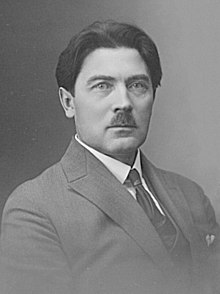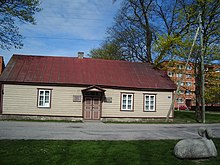Johannes Aavik
Johannes Aavik (born November 26th July / December 8th 1880 greg. In the village Randvere , then parish Pöide / Saaremaa island ; † March 18, 1973 in Stockholm / Sweden ) was an Estonian linguist and writer.
education
Johannes Aavik was born as the son of the parish clerk Mihkel Aavik (1844–1909) and his wife Ann (1849–1918). He grew up in the island's capital, Kuressaare . From 1898 to 1902 he attended the boys' high school there. After graduating from high school, he studied languages and linguistics at the University of Tartu (1902/03), at the History and Philology Institute of Nischyn (1903–1905) and at the University of Helsinki (1906–1910).
Language teacher
From 1919 to 1926 he worked as a language teacher at the Kuressaare grammar school; also in Tartu (1919–1922) and Yalta (1910/11). From 1912 to 1914 he worked as a journalist in the editorial team of the Postimees newspaper . From 1926 to 1934 Aavik was a lecturer in Estonian at the University of Tartu and a teacher at a Tartu grammar school. From 1933 to 1940 he was a private lecturer at the University of Tartu. From 1934 he was also a language officer (chief inspector for schools) of the Estonian Ministry of Education and Social Affairs and in 1940/41 he worked as an editor in a publishing house. During this time he lived in Nõmme , now a part of Tallinn .
exile
With the Soviet occupation of Estonia in 1944, Johannes Aavik managed to escape to Sweden. He worked as an archive worker in Stockholm. From 1945 to 1952 he was a lecturer at Stockholm University . He also worked as a translator and published linguistic essays.
Linguist and writer
Johannes Aavik is one of the most influential founders of the modern Estonian language in its current form. He represents the radical direction of the language renewal movement. He devoted himself to the renewal movement of the Estonian language, especially in the area of expanding the vocabulary, morphology and syntax. He presented his program in 1912 in the publication Tuleviku Eesti-keel ("The Estonian Language of the Future"). He introduced numerous loanwords, especially from Finnish . His work has modernized the Estonian language, but at the same time led to Finno-Ugric roots. He was also active in the literature movement Noor-Eesti ( Young Estonia ). Aavik was a close friend of the Estonian writers Friedebert Tuglas and Gustav Suits .
In addition, Johannes Aavik is known as an outstanding translator of works from Finnish, French , English and Russian ( Aino Kallas , Juhani Aho , Guy de Maupassant , Paul Bourget , Edgar Allan Poe and Iwan Turgenew ).
Most important works
- Eesti kirjakeele taiendamise abinõudest (1905)
- Ruth (story under the pseudonym J. Randvere, 1909)
- Keele kaunima kõlavuse poole In: Eesti Kirjandus 1912, pp. 451–484
- Eesti rahvusliku suurteose keel (1914)
- Eesti kirjakeelse stiili arenemise järgud In: Noor-Eesti V, Tartu 1915, pp. 216-229
- Eesti luule viletsused (1915)
- Keel ja kirjandus In: Sõna, Tartu 1918, pp. 72–78.
- Uute sõnade sõnastik ( Neological Dictionary, 1919)
- Uute ja vähem tuntud sõnade sõnastik (Dictionary, 1921)
- Puudused uuemas eesti luules (Poetology, 1922)
- Keeleuuenduse äärmised võimalused (1924)
- Kuidas suhtuda "Kalevipojale" (1933)
- Eesti õigekeelsuse õpik ja grammatika (orthography and grammar, 1936)
museum
The Johannes ja Joosep Aaviku Majamuuseum [Johannes and Joosep Aavik House Museum] is located in Kuressaare . Jakob Aavik, Johannes Aavik's uncle, acquired the building and the property from the gardener Johann Brenner (* 1834; † 1892). He made it available to Johannes Aavik's father Mikhel, who moved into the house on April 1, 1896 with his wife Ann (* 1849, † 1918) and their children Aadu, Liisi and Juuliga. Johannes Aavik lived here during his school days at the grammar school until 1902 and from 1919 to 1926 during his time as a teacher in Kuressaare. On June 19, 1992, the museum was established as a branch of the Saaremaa Museum. Johannes Aavik's cousin, the musician Joosep Aavik, was the son of Jakob Aavik. Joosep lived in the museum building from 1961 to 1989.
Web links
- Literature by and about Johannes Aavik in the catalog of the German National Library
- Johannes Aavik ( Memento from September 6, 2002 in the Internet Archive ) in pictures
- Johannes-und- Joosep Aavik Museum on Saaremaa at saaremaa.ee and at saaremaamuuseum.ee
- Mati Hint "The radical Language Renewal of late Johannes Aavik"
Individual evidence
- ↑ Entry in the baptismal register of the former municipality of Peude (Estonian: Pöide kogudus)
- ↑ Johannes ja Joosep Aaviku Majamuuseum. Retrieved May 15, 2017 (et-ee).
| personal data | |
|---|---|
| SURNAME | Aavik, Johannes |
| ALTERNATIVE NAMES | Randvere, J. (pseudonym) |
| BRIEF DESCRIPTION | Estonian writer and linguist |
| DATE OF BIRTH | December 8, 1880 |
| PLACE OF BIRTH | Randvere village , Saaremaa island |
| DATE OF DEATH | March 18, 1973 |
| Place of death | Stockholm , Sweden |

